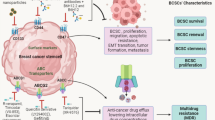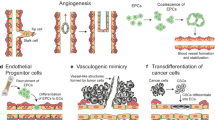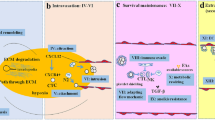Abstract
Angiogenesis is necessary for the growth of primary tumors and the formation of metastases. It is well known that vascular endothelial growth factor (VEGF) and its receptors play a major role in this process. To date, the formation of bone metastases has been poorly understood. Tumor cells must interact with the microenvironment of the bone and new blood vessels must spread. The ET/ETA(endothelin) receptor system seems to play an important role in this process. Specimens from metastatic bone lesions and non-malignant bone tissue were analyzed by histological and immunohistochemical staining. Sections were stained with antibodies against CD31, Flt-1, KDR, endothelin-1 (ET-1) and endothelin receptor A (ETA). Our studies show that there is an increased microvessel density (MVD) in metastatic bone lesions from different primary tumors in contrast to normal bone tissue. In nearly all tumor formations of the bone, ET-1 and its receptor ETA was found by immunohistochemistry. We also performed immunohistochemical staining for the VEGF-receptors Flt-1 and KDR. In conclusion, there is an increased vessel density in metastatic bone lesions in contrast to normal bone tissue. The ET/ETA system can be detected in nearly all bone specimens and is upregulated in metastatic bone lesions in contrast to healthy bone tissue.
Similar content being viewed by others
References
Folkman J. Tumor angiogenesis: Therapeutic implications. N Engl J Med 1971; 285: 1182–6.
Folkman J. Angiogenesis-dependent diseases. Semin Oncol 2001; 28: 536–42.
Folkman J. Anti-angiogenesis: New concept for therapy of solid tumors. Ann Surg 1972; 175: 409–16.
Medinger M, Drevs J. Anti-Angiogenese gegen Krebs: VEGF-Inhibitoren in der klinischen Prüfung. [Anti-angiogenesis against cancer: VEGF inhibitors in clinical trials.] Dtsch Apoth Ztg 2003; 143: 52–62.
Drevs J, Medinger M, Schmidt-Gersbach C et al. Receptor tyrosine kinases: The main targets for new anticancer therapy. Curr Drug Targets 2003; 4: 113–21.
Thomas KA. Vascular endothelial growth factor, a potent and selective angiogenic agent. J Biol Chem 1996; 271: 603–6.
Neufeld G, Cohen T, Gengrinovitch S, Poltorak Z. Vascular endothelial growth factor (VEGF) and its receptors. FASEB J 1999; 13: 9–22.
Rubanyi GM, Polokoff MA. Endothelins: Molecular biology, biochemistry, pharmacology, physiology, and pathophysiology. Pharmacol Rev 1994; 46: 325–415.
Bagnato A, Salani D, Di Castro V et al. Expression of endothelin 1 and endothelin A receptor in ovarian carcinoma: Evidence for an autocrine role in tumor growth. Cancer Res 1999; 59: 720–7.
Baley PA, Resink TJ, Eppenberger U, Hahn AW. Endothelin messenger RNA and receptors are differentially expressed in cultured human breast epithelial and stromal cells. J Clin Invest 1990; 85: 1320–3.
Bagnato A, Cirilli A, Salani D et al. Growth inhibition of cervix carcinoma cells in vivo by endothelin A receptor blockade. Cancer Res 2002; 62: 6381–4.
Nelson JB, Hedican SP, George DJ et al. Identification of endothelin-1 in the pathophysiology of metastatic adenocarcinoma of the prostate. Nature Med 1995; 1: 944–9.
Takuwa Y, Masaki T, Yamashita K. The effects of the endothelin family peptides on cultured osteoblastic cells from rat calvariae. Biochem Biophys Res Commun 1990; 170: 998–1005.
Kozawa O, Kawamura H, Hatakeyama D et al. Endothelin-1 induces vascular endothelial growth factor synthesis in osteoblasts: Involvement of p38 mitogen-activated protein kinase. Cell Signal 2000; 12: 375–80.
Carducci MA, Nelson JB, Bowling MK et al. Atrasentan, an endothelin-receptor antagonist for refractory adenocarcinomas: Safety and pharmacokinetics. J Clin Oncol 2002; 20: 2171–80.
Bagnato A, Spinella F. Emerging role of endothelin-1 in tumor angiogenesis. Trends Endocrinol Metab 2002; 14: 44–50.
Miki T, Yano S, Hanibuchi M, Sone S. Bone metastasis model with multiorgan dissemination of human small-cell lung cancer (SBC-5) cells in natural killer cell-depleted SCID mice. Oncol Res 2000; 12: 209–17.
Corey E, Quinn JE, Bladou F et al. Establishment and characterization of osseous prostate cancer models: Intra-tibial injection of human prostate cancer cells. Prostate 2002; 52: 20–33.
Iguchi H, Yokota M, Fukutomi M et al. A possible role of VEGF in osteolytic bone metastasis of hepatocellular carcinoma. J Exp Clin Cancer Res 2002; 21: 309–13.
Holleb AI, Folkman J. Tumor angiogenesis. CA Cancer J Clin 1972; 22: 226–9.
Nakagawa M, Kaneda T, Arakawa T et al. Vascular endothelial growth factor (VEGF) directly enhances osteoclastic bone resorption and survival of mature osteoclasts. FEBS Lett 2000; 473: 161–4.
Sweeney P, Karashima T, Kim S-J et al. Anti-vascular endothelial growth factor receptor 2 antibody reduces tumorigenicity and metastasis in orthotopic prostate cancer xenografts via induction of endothelial cell apoptosis and reduction of endothelial cell matrix metalloproteinase type 9 production. Clin Cancer Res 2002; 8: 2714–24.
Kopetz ES, Nelson JB, Carducci MA. Endothelin-1 as a target for therapeutic intervention in prostate cancer. Invest New Drugs 2002; 20: 173–82.
Nelson JB, Nguyen SH, Wu-Wong JR et al. New bone formation in an osteoblastic tumor model is increased by endothelin-1 overexpression and decreased by endothelin A receptor blockade. Urology 1999; 53: 1063–9.
Drevs J, Hofmann I, Hugenschmidt H et al. Effects of PTK787/ZK 222584, a specific inhibitor of vascular endothelial growth factor receptor tyrosine kinases, on primary tumor, metastasis, vessel density, and blood flow in a murine renal cell carcinoma model. Cancer Res 60: 4819–24.
Spinella F, Rosano L, Di Castro V et al. Endothelin-1 induces vascular endothelial growth factor by increasing hypoxia-inducible factor-1 alpha in ovarian carcinoma cells. J Biol Chem 2002; 277: 27850–5.
Rai A, Gulati A. Evidence for the involvement of ET(B) receptors in ET-1-induced changes in blood flow to the rat breast tumor. Cancer Chemother Pharmacol 2003; 51: 21–8.
Author information
Authors and Affiliations
Corresponding author
Rights and permissions
About this article
Cite this article
Medinger, M., Adler, C., Schmidt-Gersbach, C. et al. Angiogenesis and the ET-1/ETA Receptor System: Immunohistochemical Expression Analysis in Bone Metastases from Patients with Different Primary Tumors. Angiogenesis 6, 225–231 (2003). https://doi.org/10.1023/B:AGEN.0000021395.43438.44
Issue Date:
DOI: https://doi.org/10.1023/B:AGEN.0000021395.43438.44




